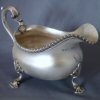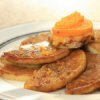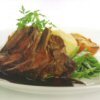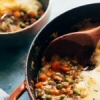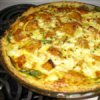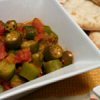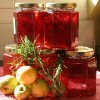6 mins
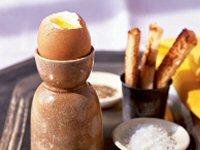
Ingredients for Boiled Egg
Currently displaying quantities in US Imperial Measurements
How to Cook Boiled Egg
- There are two or three acceptable methods of boiling an egg. The following is the most reliable way...
- Put about 2" - 3" (5cm - 7½cm) of water in a pan. Bring the water towards the boil. Once the water just begins to bubble, gently lower your egg(s) into the water on a spoon. Bring the water up to boiling point and continue to boil, cooking for exactly five minutes from the moment you placed your eggs in the water. Remove the eggs from the pan and devour immediately (or gently crack one end to prevent further cooking inside the shell).
- This method will provide you with an egg that has a soft yolk and a firm white. If you prefer your eggs softer or harder, you can decrease or increase the cooking time to suit your personal tastes. Always be sure that there is sufficient water in the pan to cover the eggs while they are cooking.
- An alternative method is to place your eggs in a pan and cover with cold water by about ½" (1cm). Place over a high heat and as soon as the water is boiling, reduce the heat and simmer for 4 minutes. Naturally, you should serve with fingers of buttered toast!
- VARIATIONS: To turn a soft-boiled egg into a hard-boiled egg (for sandwiches or salads), cook for 2-3 minutes longer (seven or eight minutes instead of five). Once cooked, remove the shell. This is best done by immersing the egg in cold water to quickly cool it, then roll it gently in the palms of your hands to crack the shell. This can then be carefully peeled away (and the job is made easier if you keep the egg or your hands wet).
- Hard-boiled eggs can be stored (with the shells still on) in a refrigerator for 4 or 5 days (but do not try to freeze them). If, for any reason, your boiled eggs get mixed up with your fresh eggs, you can tell the difference using the 'Graham Spin Test'! Place the egg on a flat surface and spin it. If is spins and slows down evenly, it is hard-boiled. If it spins and slows down erratically, it has not been cooked.
 GRAHAM'S HOT TIP:
GRAHAM'S HOT TIP:
To avoid the shell cracking when you put an egg in hot water, remove it from the fridge a little while before using to allow it to approach room temperature.
When boiling an egg, lower it gently into the pan using a spoon, just before the water actually boils. By adding a little vinegar to the water prior to putting the eggs in the pan, you will avoid any egg leaking out in the event that the shell is slightly cracked.
Reviews of Boiled Egg
 August 12 2014 August 12 2014Nice to know there are still places where beginners can learn the essentials. Well done! Geoff (6 reviews) |
What To Eat Tonight
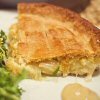
Pies, pies and more delicious pies. Steaming hot from the oven or cold from the fridge, we have a whole range to wet your taste buds.

Often quick, always easy, our selection of lunch recipes will make your mouth water in anticipation. A great way to break up the day.

Many people think that Japanese recipes are complex and need expert tuition. Not necessarily so! Our range of recipes are so easy.
Other Egg Recipes
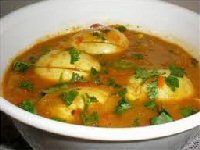
This recipe for Egg Curry> is a classic recipe of an authentic Indian curry - which often bear little resemblance to the more Westernized alternatives
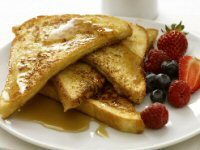
Egg Fried Bread is sometimes called French Toast although, in fact, it originates not from France but from Canada. It is quick and simple breakfast.

Whilst we accept it is hardly a "recipe" many people who are new to cooking still find boiling an egg a challenging mystery!
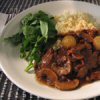 Boeuf à la Bourguignone
Boeuf à la Bourguignone 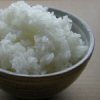 Boiled Rice
Boiled Rice 
